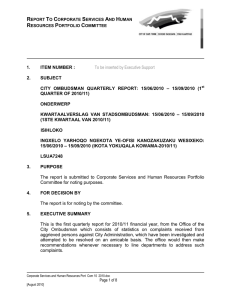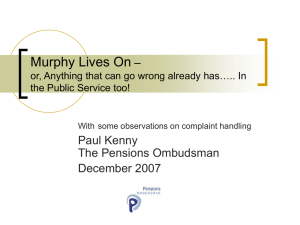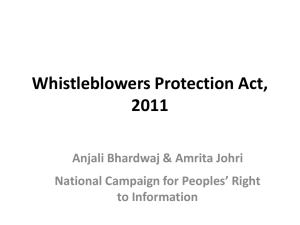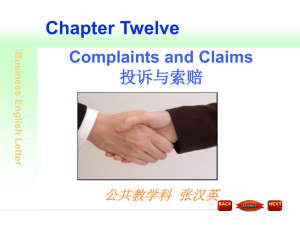D1 Collaborative Complaints
advertisement
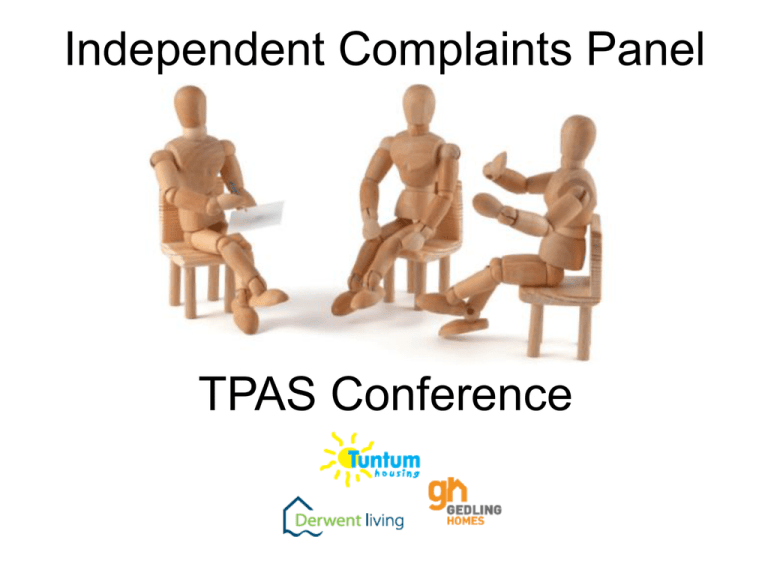
Independent Complaints Panel TPAS Conference ICP background: Localism Act 2011 • Operating from April 2013 • Introduces a local democratic filter before a referral can be made to the Ombudsman • This local democratic filter is by means of a ‘designated person’. ICP background: Localism Act 2011 The designated person may be: • A local MP • A local authority • A designated tenants panel Why a tenants panel? • Uncertainty as to the willingness, competence and capacity of MPs and LAs to deal effectively with our complaints • Tenants likely to have a better insight into the problems that can arise between Landlord and Tenant • Peer adjudication Old complaints procedure Complaint Housing Association Housing Ombudsman New complaints procedure Complaint Housing Association Designated Person Housing Ombudsman Motivation to establish an ICP • Peer group evaluation of complaint – gives a tenant’s perspective • Empowers tenants/builds capacity • May lead to a more common sense approach to complaint resolution • Economy of scale across 3 landlords • Better than LA or MP involvement! How it works • 6 panel members (2 from each landlord) • TPAS support and mentoring for 12 months • Aim to facilitate the resolution of the complaint by achieving consensus between the customer and landlord How it works Possible ICP outcomes to individual complaints: agree a resolution with complainant, put this to landlord, landlords agrees • as above but landlord does not agree refer to Ombudsman • can’t resolve complaint to satisfaction of complainant refer to Ombudsman • 8 weeks to resolve before complainant has an automatic right to go to Ombudsman Partner profiles • Derwent Living took the lead in seeking partners • Tuntum and Gedling Homes responded • Good partnership as each brings a different profile Derwent Living • Formed in 1964 • Based in Derby with properties across the Midlands, South Yorkshire and London • Affordable housing is core purpose • 8,000 homes plus 7,000 commercial • Affordable homes to rent or part-buy, partrent • Retirement Living Complaints • 577 complaints last year • 86% Maintenance related • 4% ASB • 10% Other Tuntum Housing • Founded 1988 • 1,300 general family housing • 112 units of supported/sheltered housing • Stock in Nottingham, Leicester and Derby. • BME focussed Typical tenant • • • • • • • Aged 29 Female Dual heritage Single parent with 1.8 children In part time work On welfare benefits Lives in a 2 bed house Complaints • Around 60 per year or a complaint : tenant ratio of 1:21 – 60% Maintenance related – 20% ASB – 20% Other Gedling Homes • Founded 2008 stock transfer from Gedling Borough Council • 3352 properties • 1/3 properties supported/sheltered housing • Stock in eastern suburbs of Nottingham and outlying areas Typical tenant • Retirement Age • White British • On welfare benefits • Lives in a sheltered scheme Complaints • 93 complaints received in 2012-13: tenant ratio of 1:36 • 72% Maintenance related • 13% Housing Services • 15% other Advertising campaign & marketing • Develop a brand • Use of language important • Focus on positive role of ICP Recruitment and induction • Application process with role specification • Joint assessment day • Independent assessors involved as well as landlords • Scoring matrix to ensure transparent process • Blend of skills and experience Building a cohesive team • Getting to know each other • The Theory of team cohesion – Forming, Storming, Norming, Performing • Key areas to focus on: – Clarity – Responsibility – Leadership – Feedback – Diversity Team Building Exercises ICP identity • Contributed to the brand/identity of the panel • Sense of ownership • Terms of reference • Role descriptions Skills Analysis • Role description was already created – Skills and abilities – Personal Qualities – Knowledge and Experience • “Critical Friend Role” • Training Needs Assessment • Learning Style Questionnaire Training the team • Real Life Case Studies – What policies, procedures and service standards do you need? – What questions will you ask the landlord and tenant? • Equality and Diversity How do we make the partnership work • Agreement • How it works in practice • Contact with the landlords • Working with different complaints policies ICP standards framework View from the members
